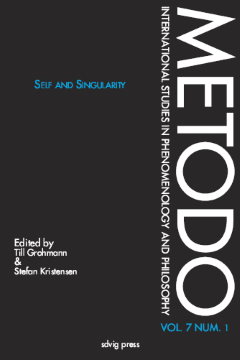Zeitschrift | Band | Artikel
At the limits of one's own body
pp. 75-108
Abstrakt
This paper examines phenomenology’s idea of the body as «one’s own» by establishing a dialogue between Merleau-Ponty and the Brazilian novelist, Clarice Lispector. Central to this study is the question of to what extent the anonymous undercurrent of existence is threat to bodily integrity. In response to this question, the paper unfolds in two stages. First, I pursue an analysis of the body in Merleau-Ponty’s phenomenology, giving special focuses to the role anonymity plays in the constitution of the body as one’s own. Arguing that Merleau-Ponty tends to underplay the disruptive implications of his thought, I then turn to Clarice Lispector’s novel The Passion According to G.H. The motivation for pairing Lispector and Merleau- Ponty is twofold: first, Lispector provides a subtle and incisive analysis of the affective experience of anonymity; two, Lispector issues a challenge to phenomenology to rethink the division between selfhood and elemental materiality.
Publication details
Published in:
Grohmann Till, Kristensen Stefan (2019) Self and singularity. Metodo 7 (1).
Seiten: 75-108
Referenz:
Trigg Dylan (2019) „At the limits of one's own body“. Metodo 7 (1), 75–108.




